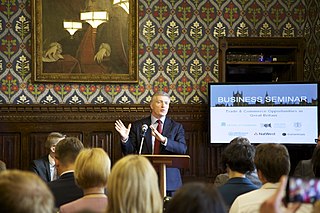
A conglomerate is a type of multi-industry company that consists of several different and unrelated business entities that operate in various industries under one corporate group. A conglomerate usually has a parent company that owns and controls many subsidiaries, which are legally independent but financially and strategically dependent on the parent company. Conglomerates are often large and multinational corporations that have a global presence and a diversified portfolio of products and services. Conglomerates can be formed by merger and acquisitions, spin-offs, or joint ventures.

The British Bankers' Association (BBA) was a trade association for the UK banking and financial services sector. From 1 July 2017, it was merged into UK Finance.

Financial services are economic services tied to finance provided by financial institutions. Financial services encompass a broad range of service sector activities, especially as concerns financial management and consumer finance.

The Confederation of British Industry (CBI) is a British business interest group, which says it represents 190,000 businesses. The CBI has been described by the Financial Times as "Britain's biggest business lobby group". Incorporated by royal charter, its mission is to promote the conditions in which businesses of all sizes and sectors in the UK can compete and prosper for the benefit of all. In 2023, the association was shaken by numerous accusations of sexual misconduct in the organisation.

The International Transport Workers' Federation (ITF) is a democratic global union federation of transport workers' trade unions, founded in 1896. In 2017 the ITF had 677 member organizations in 149 countries, representing a combined membership of 19.7 million transport workers in all industrial transport sectors: civil aviation, dockers, inland navigation, seafarers, road transport, railways, fisheries, urban transport and tourism. The ITF represents the interests of transport workers' unions in bodies that take decisions affecting jobs, employment conditions or safety in the transport industry.

The Commonwealth Business Council (CBC) was an institution of the Commonwealth Family that aimed to use the global network of the Commonwealth of Nations more effectively for the promotion of global trade and investment for shared prosperity. It was formed at the Commonwealth Heads of Government Meeting 1997 (CHOGM) in Edinburgh, United Kingdom, and replaced in July 2014 by the Commonwealth Enterprise and Investment Council (CWEIC).

The Nigerian National Petroleum Company (NNPC) Limited is a state-owned oil company in Nigeria. Still a fully-owned government company, it was transformed from a corporation into a limited liability company in July 2022. NNPC Limited is the only entity licensed to operate in the country's petroleum industry. It partners with foreign oil companies to exploit Nigeria's fossil fuel resources. The NNPC, with an asset of $153B (USD), is the largest national oil company in Africa. The company boasts of extensive infrastructure and investment in the downstream, midstream and upstream of the Nigerian petroleum industry.
Prosper, formerly the Scottish Council for Development and Industry (SCDI), was founded in 1931. It is a non-governmental, membership organisation which aims to strengthen Scotland's economic competitiveness through influencing government to create sustainable economic prosperity for Scotland.

UK Trade & Investment (UKTI) was a UK Government department working with businesses based in the United Kingdom to assist their success in international markets, and with overseas investors looking to the UK as an investment destination. It was replaced in July 2016 by the Department for International Trade.

The Hong Kong General Chamber of Commerce was founded on 29 May 1861, and is the oldest and one of the largest business organizations in Hong Kong. It has around 4,000 corporate members, who combined employ around one-third of Hong Kong's workforce. It is a self-funding, not-for-profit organization that promotes and represents the interests of the Hong Kong business community. A core function of its work is to formulate recommendations on improving the business environment, which its 23 industry-specific committees constantly analyze and make regular submissions to HKSAR Government officials and policy makers.
The China–Britain Business Council (CBBC) is the leading British organisation promoting trade and investment between the UK and China.
Suiting Themselves: How Corporations Drive the Global Agenda is a 2006 book by Professor Sharon Beder. Beder argues that an international corporate elite dictate global politics for their own benefit. She suggests that they created business associations and think tanks in the 1970s to drive public policy, push a free trade agenda, and promote the worldwide privatization and deregulation of public services in the 1980s and 1990s, and have worked since the late 1990s to rewrite the rules of the global economy.
TheCityUK is a private-sector membership body and industry advocacy group promoting the financial and related professional services industry of the United Kingdom (UK). TheCityUK is often referred to as the industry's "most powerful" or "most prominent" lobbyists with close links to the UK Government and to policymakers in Brussels and Washington.

The UK India Business Council (UKIBC) is a membership-based, non-profit organization founded in 2007 to foster trade and business relations between the United Kingdom and India. The organization works with businesses in both countries, as well as the UK and Indian governments, to promote and increase bilateral trade. The UK India Business Council supports UK businesses with the insights, networks, policy advocacy, services, and facilities needed to succeed in India.
The British-Swiss Chamber of Commerce (BSCC) is an independent not-for-profit organisation founded in 1920 with more than 500 members. It aims to improve business relations between Switzerland, Liechtenstein, and the UK. The BSCC is a forum for debate and networking. The BSCC is composed of corporate, SME, and individual members, who are categorized into four groups, called network, promote, lead, and influence. BSCC members represent the majority of business sectors. Its activities include organising events, providing advisory services and creating a platform for the exchange of information and experience between Switzerland and the UK.
Arab British Chamber of Commerce established 6 February 1975, is an international trade organisation based in London. Although a not-for-profit body, its role is to encourage, promote and facilitate trade, investment and joint ventures since 1975 between participating representatives of Arab states and of the United Kingdom (UK).
Economic globalization is one of the three main dimensions of globalization commonly found in academic literature, with the two others being political globalization and cultural globalization, as well as the general term of globalization. Economic globalization refers to the widespread international movement of goods, capital, services, technology and information. It is the increasing economic integration and interdependence of national, regional, and local economies across the world through an intensification of cross-border movement of goods, services, technologies and capital. Economic globalization primarily comprises the globalization of production, finance, markets, technology, organizational regimes, institutions, corporations, and people.
The British Chamber of Commerce in Japan is an independent non-profit organisation that promotes trade and aims to strengthen business ties between the UK and Japan. The BCCJ, which marked its 70th anniversary in 2018, is a private membership organisation serving over 970 high-calibre members - of which approximately 218 are member companies.
Between 1967 and 2016, the Emergency Committee for American Trade (ECAT) was a U.S. trade body representing U.S.-based international business enterprises from the principal sectors of the U.S. economy.

The Latvian-British Chamber of Commerce was an independent institution, NGO, and social enterprise based in Bristol, England. It was first established in 2010. The mission of the Latvian-British Chamber of Commerce was to "encourage, promote and foster business interests and commercial relations between Latvia and the UK within the core fields of technology, innovation and start-ups." The Latvian-British Chamber of Commerce was dissolved on 19 January 2021, according the information from the Companies House.









